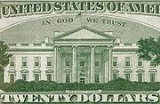
In God We Trust
Encyclopedia
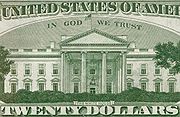
United States national motto
The modern motto of the United States of America, as established in a 1956 law signed by President Dwight D Eisenhower, is In God We Trust. The phrase IN GOD WE TRUST as a motto for currency first appeared on United States coins in 1864.The 1956 law was the first establishment of an official...
in 1956. It is also the motto of the U.S. state
U.S. state
A U.S. state is any one of the 50 federated states of the United States of America that share sovereignty with the federal government. Because of this shared sovereignty, an American is a citizen both of the federal entity and of his or her state of domicile. Four states use the official title of...
of Florida
Florida
Florida is a state in the southeastern United States, located on the nation's Atlantic and Gulf coasts. It is bordered to the west by the Gulf of Mexico, to the north by Alabama and Georgia and to the east by the Atlantic Ocean. With a population of 18,801,310 as measured by the 2010 census, it...
. The Legality of this motto has been questioned because of the United States Constitution forbidding the government to make any law respecting the establishment of a religion; however, the United States Supreme Court has rejected the legal basis for this claim. E pluribus unum
E pluribus unum
E pluribus unum , Latin for "Out of many, one", is a phrase on the Seal of the United States, along with Annuit cœptis and Novus ordo seclorum, and adopted by an Act of Congress in 1782...
is the unofficial motto of the United States. In God We Trust has appeared on U.S. coins since 1864 and on paper currency
Federal Reserve Note
A Federal Reserve Note is a type of banknote used in the United States of America. Federal Reserve Notes are printed by the United States Bureau of Engraving and Printing on paper made by Crane & Co. of Dalton, Massachusetts. They are the only type of U.S...
since 1957. Its Spanish
Spanish language
Spanish , also known as Castilian , is a Romance language in the Ibero-Romance group that evolved from several languages and dialects in central-northern Iberia around the 9th century and gradually spread with the expansion of the Kingdom of Castile into central and southern Iberia during the...
equivalent, En Dios Confiamos, is the motto of the Republic of Nicaragua
Nicaragua
Nicaragua is the largest country in the Central American American isthmus, bordered by Honduras to the north and Costa Rica to the south. The country is situated between 11 and 14 degrees north of the Equator in the Northern Hemisphere, which places it entirely within the tropics. The Pacific Ocean...
.
History
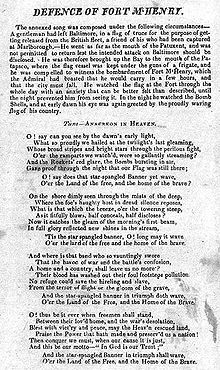
Salmon P. Chase
Salmon Portland Chase was an American politician and jurist who served as U.S. Senator from Ohio and the 23rd Governor of Ohio; as U.S. Treasury Secretary under President Abraham Lincoln; and as the sixth Chief Justice of the United States Supreme Court.Chase was one of the most prominent members...
, the U.S. Treasury Secretary under President Abraham Lincoln
Abraham Lincoln
Abraham Lincoln was the 16th President of the United States, serving from March 1861 until his assassination in April 1865. He successfully led his country through a great constitutional, military and moral crisis – the American Civil War – preserving the Union, while ending slavery, and...
. Chase wrote in an 1861 letter to James Pollock
James Pollock
James Pollock was the 13th Governor of the State of Pennsylvania from 1855 to 1858.- Political career :James Pollock graduated from the College of New Jersey at Princeton before setting up a law practice in his home community, in Milton, Pennsylvania...
, then Director of the Mint
Director of the United States Mint
The Director of the United States Mint is the head of the United States Mint. The position is currently vacant following the resignation of Edmund C. Moy in January 2011....
in Philadelphia, that "no nation can be strong except in the strength of God, or safe except in His defense. The trust of our people in God should be declared on our national coins."
Aspirations for the motto arrose surrounding the turmoil and heightened religious sentiment that existed during the Civil War
American Civil War
The American Civil War was a civil war fought in the United States of America. In response to the election of Abraham Lincoln as President of the United States, 11 southern slave states declared their secession from the United States and formed the Confederate States of America ; the other 25...
. The Reverend M. R. Watkinson, in a letter dated 13 November 1861, petitioned the Treasury Department to add a statement recognising "Almighty God in some form in our coins." However Treasury Secretary Chase did not submit the motto with the words "In God We Trust" until December 9, 1863.
The act approving the motto to be placed on the 1-cent and newly created 2-cent
Two-cent piece (United States coin)
The two-cent coin was produced in the United States from 1864–1873 with decreasing mintages throughout that time. In terms of consumer price indexes, the 1864 coin would be comparable to $ in today's money....
piece passed April 22, 1864. This was followed in 1866 by the 5 cent nickel
Shield nickel
The Shield nickel was the first United States five cent piece to be made out of copper-nickel, the same alloy of which American nickels are struck today. Designed by James B. Longacre, the coin was issued from 1866 until 1883, when it was replaced by the Liberty Head nickel...
(1866–1883), quarter dollar
Quarter (United States coin)
A quarter dollar, commonly shortened to quarter, is a coin worth ¼ of a United States dollar, or 25 cents. The quarter has been produced since 1796. The choice of 25¢ as a denomination, as opposed to 20¢ which is more common in other parts of the world, originated with the practice of dividing...
, half dollar
Half dollar (United States coin)
Half dollar coins have been produced nearly every year since the inception of the United States Mint in 1794. Sometimes referred to as the fifty-cent piece, the only U.S. coin that has been minted more consistently is the cent.-Circulation:...
, silver dollar, and gold dollars
Gold dollar
The gold dollar was a United States dollar coin produced from 1849 to 1889. Composed of 90% pure gold, it was the smallest denomination of gold currency ever produced by the United States federal government...
. An 1865 law allowed the motto to be used on coins. The use of the motto was permitted, but not required, by an 1873 law. While several laws come into play, the act of May 18, 1908, is most often cited as requiring the motto (even though the cent and nickel were excluded from that law, and the nickel
Nickel (United States coin)
The nickel is a five-cent coin, representing a unit of currency equaling five hundredths of one United States dollar. A later-produced Canadian nickel five-cent coin was also called by the same name....
did not have the motto added until 1938). Since 1938, all coins have borne the motto.
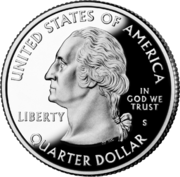
Pledge of Allegiance
The Pledge of Allegiance of the United States is an expression of loyalty to the federal flag and the republic of the United States of America, originally composed by Christian Socialist Francis Bellamy in 1892 and formally adopted by Congress as the pledge in 1942...
, the U.S. Congress enacted Public Law 84-140, which required the motto on all coins and currency. The law was approved by President Eisenhower
Dwight D. Eisenhower
Dwight David "Ike" Eisenhower was the 34th President of the United States, from 1953 until 1961. He was a five-star general in the United States Army...
on July 30, 1956, and the motto was progressively added to paper money over a period from 1957 to 1966. In 1956 the phrase was legally adopted as the United States' national motto by a law passed by the 84th United States Congress.(Public Law 84-851)", and the United States Code at , now states: "'In God we trust' is the national motto."
In 2006, on the 50th anniversary of its adoption, the Senate
United States Senate
The United States Senate is the upper house of the bicameral legislature of the United States, and together with the United States House of Representatives comprises the United States Congress. The composition and powers of the Senate are established in Article One of the U.S. Constitution. Each...
reaffirmed "In God We Trust" as the official national motto of the United States of America. In 2011 the House of Representatives
United States House of Representatives
The United States House of Representatives is one of the two Houses of the United States Congress, the bicameral legislature which also includes the Senate.The composition and powers of the House are established in Article One of the Constitution...
passed an additional resolution reaffirming "In God We Trust" as the official motto of the United States, in a 396-9 vote. According to a 2003 joint poll by USA Today
USA Today
USA Today is a national American daily newspaper published by the Gannett Company. It was founded by Al Neuharth. The newspaper vies with The Wall Street Journal for the position of having the widest circulation of any newspaper in the United States, something it previously held since 2003...
, CNN
CNN
Cable News Network is a U.S. cable news channel founded in 1980 by Ted Turner. Upon its launch, CNN was the first channel to provide 24-hour television news coverage, and the first all-news television channel in the United States...
, and Gallup
The Gallup Organization
The Gallup Organization, is primarily a research-based performance-management consulting company. Some of Gallup's key practice areas are - Employee Engagement, Customer Engagement and Well-Being. Gallup has over 40 offices in 27 countries. World headquarters are in Washington, D.C. Operational...
, 90% of Americans support the inscription "In God We Trust" on U.S. coins.
Similar phrases or derivations can be found in the Bible
Bible
The Bible refers to any one of the collections of the primary religious texts of Judaism and Christianity. There is no common version of the Bible, as the individual books , their contents and their order vary among denominations...
(including Psalms 20, Psalms 56, & Psalms 62). The phrase has been incorporated in many hymns and patriotic songs. The final stanza of The Star-Spangled Banner
The Star-Spangled Banner
"The Star-Spangled Banner" is the national anthem of the United States of America. The lyrics come from "Defence of Fort McHenry", a poem written in 1814 by the 35-year-old lawyer and amateur poet, Francis Scott Key, after witnessing the bombardment of Fort McHenry by the British Royal Navy ships...
, written in 1814 by Francis Scott Key
Francis Scott Key
Francis Scott Key was an American lawyer, author, and amateur poet, from Georgetown, who wrote the lyrics to the United States' national anthem, "The Star-Spangled Banner".-Life:...
(and later adopted as the U.S. national anthem
National anthem
A national anthem is a generally patriotic musical composition that evokes and eulogizes the history, traditions and struggles of its people, recognized either by a nation's government as the official national song, or by convention through use by the people.- History :Anthems rose to prominence...
), contains an early reference to a variation of the phrase: "...And this be our motto: 'In God is our trust'." During the American Civil War
American Civil War
The American Civil War was a civil war fought in the United States of America. In response to the election of Abraham Lincoln as President of the United States, 11 southern slave states declared their secession from the United States and formed the Confederate States of America ; the other 25...
, the 125th Pennsylvania Infantry
125th Pennsylvania Infantry
The 125th Pennsylvania Infantry volunteered during the American Civil War, served from August of 1862 until May of 1863, a 9 month term, and selected the motto In God We Trust. Led by Colonel Jacob Higgins less than six weeks after being recruited in Blair, Cambria and Huntindgon Counties, the...
for the Union
Union (American Civil War)
During the American Civil War, the Union was a name used to refer to the federal government of the United States, which was supported by the twenty free states and five border slave states. It was opposed by 11 southern slave states that had declared a secession to join together to form the...
Army
Union Army
The Union Army was the land force that fought for the Union during the American Civil War. It was also known as the Federal Army, the U.S. Army, the Northern Army and the National Army...
assumed the motto "In God We Trust" in early August 1862.
Gallery
File:Florida state flag.png|Flag of Florida
Flag of Florida
The flag of the State of Florida consists of a red saltire on a white background, with the seal of Florida superimposed on the center. The design was approved by a popular referendum in 1900...
File:Pennsylvania State Capitol 3.jpg|The Pennsylvania State Capitol
File:Flag of Georgia (U.S. state).svg|Flag of Georgia
Controversy
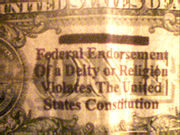
First Amendment to the United States Constitution
The First Amendment to the United States Constitution is part of the Bill of Rights. The amendment prohibits the making of any law respecting an establishment of religion, impeding the free exercise of religion, abridging the freedom of speech, infringing on the freedom of the press, interfering...
and the Separation of church and state
Separation of church and state in the United States
The phrase "separation of church and state" , attributed to Thomas Jefferson and others, and since quoted by the Supreme Court of the United States, expresses an understanding of the intent and function of the Establishment Clause of the First Amendment to the Constitution of the United States...
. The motto was first challenged in Aronow v. United States
Aronow v. United States
Aronow v. United States was the first case to challenge the inclusion of "In God We Trust" on U.S. currency.In that case, Stefan Ray Aronow challenged the constitutionality of the motto and its placement on U.S. currency and coinage...
in 1970, but the United States Court of Appeals for the Ninth Circuit
United States Court of Appeals for the Ninth Circuit
The United States Court of Appeals for the Ninth Circuit is a U.S. federal court with appellate jurisdiction over the district courts in the following districts:* District of Alaska* District of Arizona...
ruled: "It is quite obvious that the national motto and the slogan on coinage and currency 'In God We Trust' has nothing whatsoever to do with the establishment of religion. Its use is of patriotic or ceremonial character and bears no true resemblance to a governmental sponsorship of a religious exercise." The decision was cited in Elk Grove Unified School District v. Newdow
Elk Grove Unified School District v. Newdow
Newdow v. United States Congress, Elk Grove Unified School District, et al., 542 U.S. 1 , was a lawsuit originally filed in 2000 which led to a 2002 ruling by the United States Court of Appeals for the Ninth Circuit that the words "under God" in the Pledge of Allegiance are an endorsement of...
, a 2004 case on the Pledge of Allegiance
Pledge of Allegiance
The Pledge of Allegiance of the United States is an expression of loyalty to the federal flag and the republic of the United States of America, originally composed by Christian Socialist Francis Bellamy in 1892 and formally adopted by Congress as the pledge in 1942...
. These acts of "ceremonial deism
Ceremonial deism
Ceremonial deism is a legal term used in the United States for nominally religious statements and practices deemed to be merely ritual and non-religious through long customary usage. Proposed examples of ceremonial deism include the reference to God introduced into the Pledge of Allegiance in...
" are "protected from Establishment Clause scrutiny chiefly because they have lost through rote repetition any significant religious content." In Zorach v. Clauson
Zorach v. Clauson
Zorach v. Clauson, 343 U.S. 306 , was a case in which the Supreme Court of the United States considered a New York law that permitted schools to allow some students to leave school during school hours for purposes of religious instruction or practice while requiring others to stay in school...
(1952), the Supreme Court has also held that the nation's "institutions presuppose a Supreme Being" and that government recognition of God
God
God is the English name given to a singular being in theistic and deistic religions who is either the sole deity in monotheism, or a single deity in polytheism....
does not constitute the establishment of such a state church as the Constitution's authors intended to prohibit. Constitutionalists object to sworn judiciaries employing historical context in what they believe ought to be a raw textual interpretation.
Some atheists and separationists have been known to cross out the motto on paper money or stamp on an alternative slogan as a form of protest. Federal law ( and ) prohibits defacement of currency, but it specifies either "intent to render such bank bill...unfit to be reissued" or a "notice or advertisement", and no documented cases exist of prosecution for such action. Additionally, the Federal Reserve frequently recirculates similarly altered notes.
Outside of constitutional objections, President Theodore Roosevelt
Theodore Roosevelt
Theodore "Teddy" Roosevelt was the 26th President of the United States . He is noted for his exuberant personality, range of interests and achievements, and his leadership of the Progressive Movement, as well as his "cowboy" persona and robust masculinity...
took issue with placing the motto on coinage as he considered it sacrilegious
Sacrilege
Sacrilege is the violation or injurious treatment of a sacred object. In a less proper sense, any transgression against the virtue of religion would be a sacrilege. It can come in the form of irreverence to sacred persons, places, and things...
to put the name of God on money.
Notable mentions
A long-standing, irreverent joke slogan was eventually cited as the title of Jean ShepherdJean Shepherd
Jean Parker Shepherd was an American raconteur, radio and TV personality, writer and actor who was often referred to by the nickname Shep....
's book, In God We Trust, All Others Pay Cash
In God We Trust, All Others Pay Cash
In God We Trust, All Others Pay Cash is a book of short stories by Jean Shepherd .It was first published by Doubleday in New York in October 1966....
.
In the movie "Oh God", God (played by George Burns
George Burns
George Burns , born Nathan Birnbaum, was an American comedian, actor, and writer.He was one of the few entertainers whose career successfully spanned vaudeville, film, radio, television and movies, with and without his wife, Gracie Allen. His arched eyebrow and cigar smoke punctuation became...
) says to his reluctant disciple Jerry Landers (John Denver
John Denver
Henry John Deutschendorf, Jr. , known professionally as John Denver, was an American singer/songwriter, activist, and humanitarian. After growing up in numerous locations with his military family, Denver began his music career in folk music groups in the late 1960s. His greatest commercial success...
), "Trust me. Like it says on the money."
External links
- "The U.S. National Mottos: Their history & constitutionality"
- Final answer? Not quite as star gets second chance to play for a million - article in The GuardianThe GuardianThe Guardian, formerly known as The Manchester Guardian , is a British national daily newspaper in the Berliner format...
about a disputed quiz question about the motto of the United States. - A petition the Obama administration to: Change the motto of the United States of America to "E Pluribus Unum" On October 13th, 2011 this petition had 789 signatures needed by October 30, 2011 to reach goal of 5,000. Total signatures on this petition were 6,945 by the October 30, 2011 deadline.

